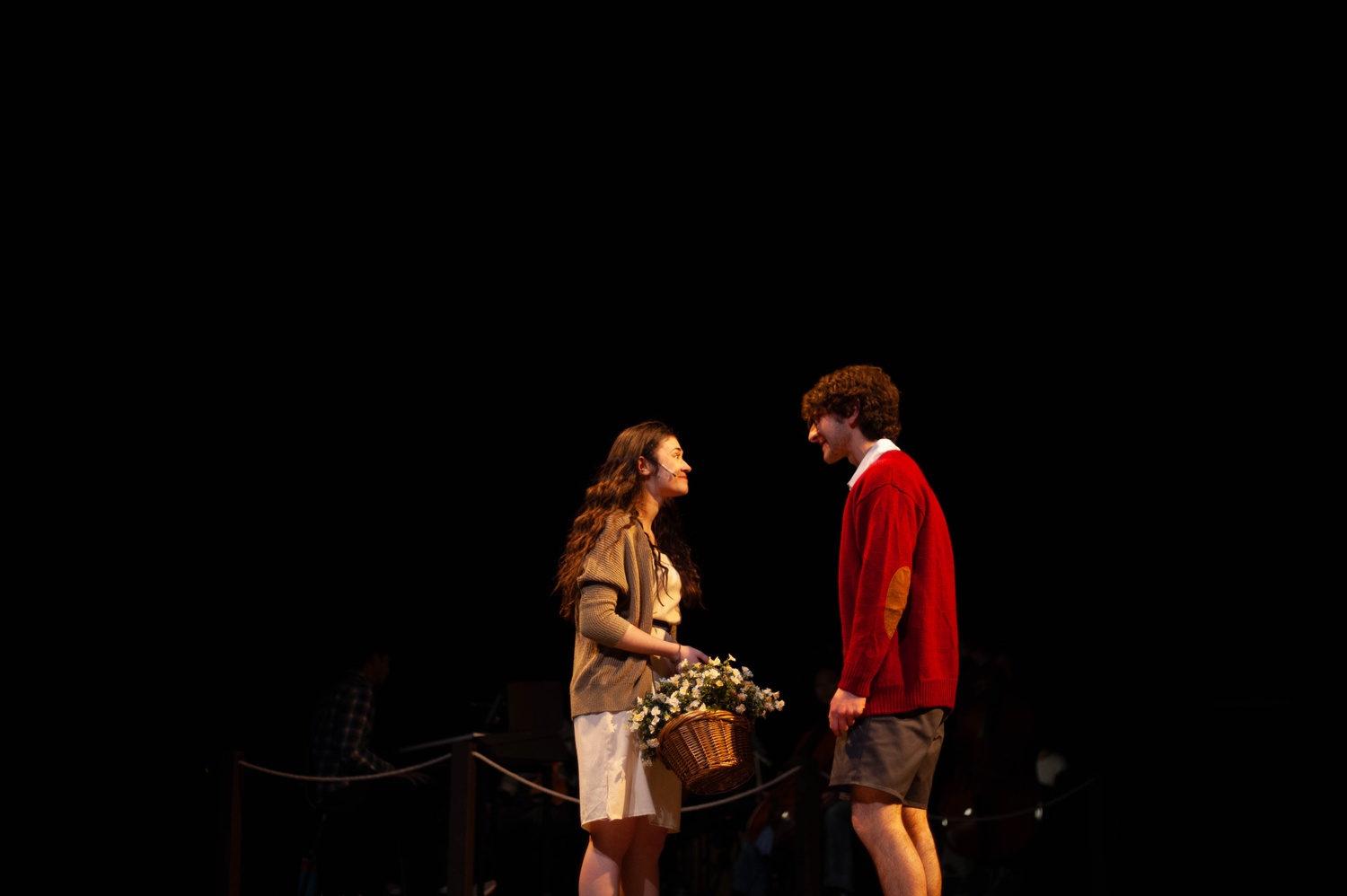
News
Summers Will Not Finish Semester of Teaching as Harvard Investigates Epstein Ties

News
Harvard College Students Report Favoring Divestment from Israel in HUA Survey

News
‘He Should Resign’: Harvard Undergrads Take Hard Line Against Summers Over Epstein Scandal

News
Harvard To Launch New Investigation Into Epstein’s Ties to Summers, Other University Affiliates

News
Harvard Students To Vote on Divestment From Israel in Inaugural HUA Election Survey
‘Spring Awakening’ Review: A Beautiful Performance Lacking in Subversion

Nobody knew what to expect from Harvard’s 2024 production of Spring Awakening. Shrouded in secrecy, the production’s blank white posters scattered across campus said only: “It’s the 1890s. A group of teens living in a German town with puritanical attitudes and sexual oppression experience their sexual awakenings… things get BATSHIT INSANE.” Walking into the theater, innocent audience members greeted each other with eager speculation. Those who had googled the plot smirked silently and waited for the show to begin.
Harvard’s production of “Spring Awakening” is based on Duncan Sheik and Steven Sater’s 2006 coming-of-age rock musical, which in turn was inspired by Frank Wedekind’s 1891 play, also entitled “Spring Awakening.” Although written 115 years before the musical, Wedekind’s play was banned on the first night of its original run for depicting abortion, sexual assault, suicide, homosexuality, and non-marital sex — topics that are still controversial today. The vividly dramaticized erotic fantasies and brutal critique of contemporary sex culture is the essence of the story, in both the 1891 play and the 2006 musical. Directed by Grace H. Allen ’24, Harvard’s 2024 adaptation, for all its incredible artistic talent, lacks the subversive and defiant tone that is so crucial to these other works.
The musical opened with a list of trigger warnings, from suicidal ideation to sex with dubious consent. The lights dimmed as faculty members, overexcited theater nerds, and poorly informed couples seeking a romantic evening nervously eyed each other, wondering what the next two hours would bring.
However, audience members can likely agree on one thing — the show’s music was transcendent. The ethereal voice of Shannon M. Harrington ’26 permeated the theater in the opening lines of “Mama Who Bore Me,” wrapping the enthralled audience in a sense of seraphic splendor. Her portrayal of Wendla, a young woman navigating the challenges of her emerging sexuality amidst enforced ignorance, is exquisitely painful. Harrington’s raw sense of innocence and curiosity through the tumultuous tale made her heartbreakingly vulnerable to the manipulations of other characters, from her own mother — stunningly portrayed by Texaco Texeira-Ramos ’26 — to her lover Melchior Gabor — played by Jonah J. Sorscher ’25.
Sorscher’s portrayal of Melchior, an atheistic schoolroom rebel, was equally outstanding. This production’s Melchior was simultaneously understandable and contemptible — a character aware of himself as the lead, capable of kindness and cruelty in equal measure. In his first scene, the character visually stood out from his schoolfellows through his cherry red sweater and look of disinterested rebellion. Sorscher sat rigidly during the Latin chanting sequence and militaristic choreography of the schoolroom, before springing into action as the music transitioned to “The Bitch of Living,” allowing his anger at a world where “thought is suspect” to reverberate through music. The question of intellectual independence was a crucial aspect of Sorscher’s portrayal, which sensitively explored how intelligence can blind one to the wellbeing of others.
Although the performers were exemplary, the version of “Spring Awakening” staged at the Loeb Proscenium last weekend could have immersed its audience more deeply in the sexually repressive world of 1890s Germany. The costumes by Al M. Bilski ’25, which consisted of cardigans and light summer dresses for the teenage characters, failed to evoke the strict Victorian standards of modesty so crucial to the original musical. It was difficult to believe that the female characters were so miserably misinformed by their elders when they wore costumes completely anachronistic to the time period in which the musical was set.
The minimalist set design by John “Jack” F. Griffin ’25 and Kelly Ding ’25, consisting mainly of a series of wooden platforms, contributed to the sensation that Harvard’s production was floating in space — a story of rebellion against an oppressive society that gave no context for what that society was. Although the performers’ acting was fiery and impassioned, the combination of contemporary costumes, minimalist set design, and modern dialogue did not create a world for them to rebel against.
The effectiveness of the original Broadway musical stemmed from the way it modernized the 1891 play, crafting songs like “Totally Fucked” from Wedekind’s brutally honest source material. The music is rendered more rebellious, more beautiful, and more painful through the jarring juxtaposition of modern language and instrumentation with the seemingly idyllic pastoral German setting. This juxtaposition was what elevated “Spring Awakening” from a collection of excellent songs to a cohesive rejection of purity culture and sexual repression. Though achingly beautiful in the actors’ performance and ambitious in its direction, Harvard’s production sank into a vague temporal space just as removed from our own time as Wedekind’s. The musical’s traumatic elements felt hollow and its emotional resonance abruptly stifled by the lack of a believable setting, making the musical’s emotional core less impactful then it could have been. Nevertheless, “Spring Awakening” proved to be perfectly cast and brilliantly performed, making the production a spectacle worth watching.
“Spring Awakening” ran at the Loeb Proscenium from April 3 to April 6.
Want to keep up with breaking news? Subscribe to our email newsletter.
